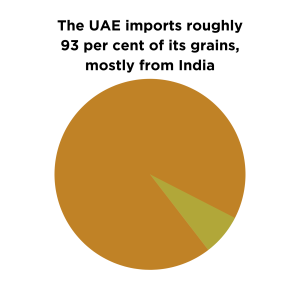The Middle East is well known for its dry and arid climate, but what is often less understood is the volatility of its food systems. The region is warming at twice the global average causing alarming levels of crop failure.
 Food security in the Middle East is fragile because of the lack of arable land, water scarcity and desertification, coupled with high rates of food imports. Researchers at the Abdul Latif Jameel Water and Food Systems Lab at MIT in the United States have been analysing food imports to the region and have noticed increasingly concerning trends on the impact of climate change on food security, especially in the GCC, where some countries import a sizeable percentage of its staple food. For instance, the United Arab Emirates imports roughly 93 per cent of its grains, mostly from India.
Food security in the Middle East is fragile because of the lack of arable land, water scarcity and desertification, coupled with high rates of food imports. Researchers at the Abdul Latif Jameel Water and Food Systems Lab at MIT in the United States have been analysing food imports to the region and have noticed increasingly concerning trends on the impact of climate change on food security, especially in the GCC, where some countries import a sizeable percentage of its staple food. For instance, the United Arab Emirates imports roughly 93 per cent of its grains, mostly from India.
As the region braces itself for another year of potentially record-breaking summer temperatures 2022 has become an inflexion point in our ability to tackle food insecurity. The UNFCCC’s hosting of the first-ever MENA Climate Week, as well as COP27 in Egypt, where Community Jameel will look to convene its own high-level panel, must make up for COP26’s failings. In Glasgow, food security was almost ignored despite our urgent need to put in place global and regional scientific partnerships to create a roadmap and develop innovative solutions to help vulnerable regions like the Middle East. 2022 must be the year that we do this.
How we go about creating these scientific partnerships will define our success as much as our commitment to creating them in the first place. As an organisation from the Global South, which partners with some of the best scientific communities around the world to advance major breakthroughs, we have a clear view of how they need to be created. Given the global nature of food security and climate change, working in concert will be critical to finding successful solutions.
First, we must look to build greater strategic partnerships and bring together different voices and experts, especially local voices. I’ve seen the impact this can have first-hand through the Jameel Observatory – a centre of excellence Community Jameel launched last year in Nairobi with the International Livestock and Research Institute, University of Edinburgh, Save the Children and the Jameel Poverty Action Lab (J-PAL). Community Jameel convened Kenyan, UK and US academics with development practitioners to ensure different expertise are consulted in tackling food insecurity in East Africa. Next month we will also be engaging the wider community in the region for our first Community of Practice meeting, to ensure that the work conducted by the Jameel Observatory meets the needs of the local community and aligns with government priorities.
The time to act is now to deliver a sustainable, affordable, healthy and inclusive food system for the region.
In addition, these partnerships must include different funding partners that also engage the private sector. Reliance on one short-term funding partner is unsustainable and is, unfortunately, a common occurrence in the development sector. Taking a private-sector approach that incorporates different financial models and partners, will ensure long-term sustainability of initiatives that can, ultimately, be self-sustaining. A great example is BRAC’s dairy and food social enterprise, which pools finances to help secure market access for dairy farmers in Bangladesh, while also generating returns that can be reinvested.
It will also be vital to ensure that research has a pathway to impact and directly engages policymakers. Engaging with policymakers from the start or developing knowledge pathways as part of the initial design is critical, whether that is informing public policy, financial spending or scale-up opportunities. For instance, J-PAL routinely runs knowledge-transfer programmes with relevant government ministries to ensure their evidence-based lessons strengthen decision-making, rather than only publishing material online in the hopes that it will reach the right audience.
Lastly, we must ensure that all scientific partnerships embody the principles of equity and open science.
If we create scientific partnerships based on this approach, we will be better equipped to find effective and innovative solutions that are equitable and applicable to communities on the ground. With more than half of the region’s population unable to afford healthy food the time to act is now to deliver a sustainable, affordable, healthy and inclusive food system for the region.
On 28 March, the first day of MENA Climate Week, Community Jameel and the Office of The UAE Special Envoy for Climate Change brought together a large group of stakeholders to inspire action to create these partnerships as we look ahead to the remainder of this pivotal year.
Uzma Sulaiman is Associate Director, Partnerships at Community Jameel.






Comments (0)